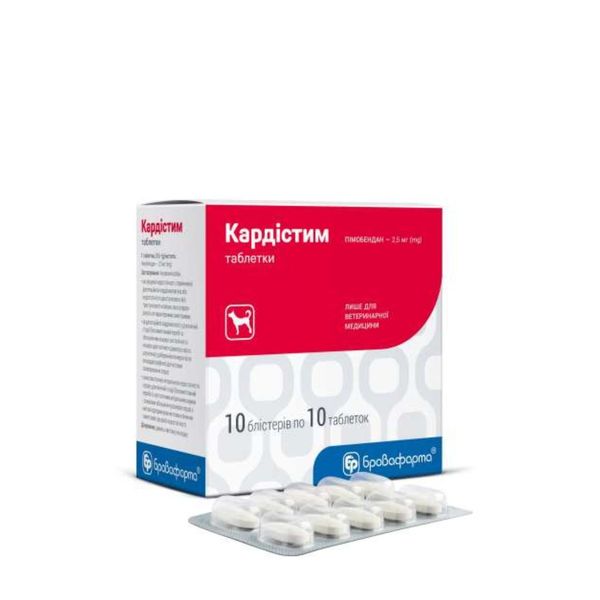|
Quantity
|
Out of stock
|
||
|
|
|||
Storage
1 tablet (0.5 g) contains:
pimobendan — 2.5 mg
Description
Tablets of white or light gray color, biconvex oblong shape with a notch on one side and the manufacturer's logo on the other.
Pharmacological properties
Pimobendan is a derivative compound of benzimidazole-pyridazinone, a non-sympathomimetic, non-glycoside inotropic substance with pronounced vasodilator (vasodilator) properties.
In contrast to cardiac glycosides, the positive inotropic effect of pimobendan is due to an increase in the calcium sensitivity of cardiac muscle myofilaments and inhibition of phosphodiesterase III (PDE III) activity. The vasodilator effect is also provided by inhibiting the activity of phosphodiesterase III. Due to its positive inotropic and vasodilatory effect, the drug in heart failure increases the force of heart contractions and reduces both preload and afterload.
Bioavailability when taken orally is 60-63% and is significantly reduced when used with food.
The volume of distribution is 2.6 l/kg. This means that pimobendan is distributed evenly in tissues. Average binding to blood plasma proteins is 93%.
It is demethylated by oxidation to the main active metabolite (UD-CG 212) with further metabolic transformation into phase II conjugates of UD-CG212 (glucuronides and sulfates).
The half-life from blood plasma is 0.4±0.1 hours, which corresponds to a high clearance of 90±19 ml/min/kg and a short mean retention time of 0.5±0.1 hours. The half-life of the most active metabolite is 2.0±0.3 hours. Pimobendan is almost completely excreted from the body with bile.
Indication
Treatment of dogs for diseases:
heart failure caused by dilated cardiomyopathy or bicuspid or tricuspid valve insufficiency, which is accompanied by characteristic symptoms (cough, shortness of breath, fainting, decreased activity, exercise intolerance, or ascites);
dilated cardiomyopathy in the preclinical stage (asymptomatic course with an increase in the end-systolic and end-diastolic diameter of the left ventricle) in Doberman pinschers after echocardiographic diagnosis of heart disease;
myxomatous mitral heart failure in the preclinical stage (asymptomatic course with systolic mitral murmur and signs of heart enlargement) in order to postpone the appearance of clinical symptoms of heart failure.
Contraindication
Do not prescribe to animals with increased sensitivity to the active substance of the drug, with hypertrophic cardiomyopathy or clinical conditions when it is not possible to increase cardiac blood output due to functional or anatomical features (for example, stenosis of the aorta), with severe liver function disorders.
Method of application and dosage
The drug is used orally one hour before feeding the animal.
The dose is prescribed by a veterinarian individually, depending on the severity of the disease and the condition of the animal. The daily dose of pimobendan is 0.2-0.6 mg per 1 kg of body weight, it is divided into two doses and given in the morning and in the evening. The recommended daily dose is 0.5 mg per 1 kg of body weight.
Dosages of the drug depend on the dog's body weight and are listed in the table.
Weight of the dog, kg Daily dose of pimobendan, mg Number of tablets per day
Up to 5 1.25 1/2
5-10 2.5 1
11-12 5.0 2
21-30 7.5 3
31-40 10.0 4
41-50 15.0 6
For a more accurate dosage, the tablet can be divided into two or four parts.
In case of congestive heart failure, the veterinary medicine doctor selects an individual dose of the drug for use throughout life.
The drug can be used together with diuretics, such as furosemide.
Reservation
When used in recommended doses, side effects usually do not occur.
Occasionally there is a slight positive chronotropic effect (increased heart rate) and vomiting. However, it can be avoided by reducing the dose of the drug. Sometimes there is transient diarrhea, lack of appetite or lethargy. In some cases, during long-term treatment with pimobendan in dogs with mitral heart disease, an increase in mitral valve regurgitation is found.
Although the relationship with the action of pimobendan has not been clearly established, very rarely during treatment, signs of an effect on primary hemostasis (mucous membrane petechiae, subcutaneous bleeding) can be observed. They disappear after stopping treatment.
Blood glucose levels should be checked regularly when treating diabetic dogs.
Cardiac monitoring is recommended for animals receiving pimobendan.
Laboratory studies on rats and rabbits did not reveal teratogenic and fetotoxic effects of pimobendan. However, it is toxic to pregnant females and embryotoxic when used in high doses, and is also excreted in milk. The safety of the drug for pregnant and lactating bitches has not been assessed. The drug can be used during pregnancy and lactation only after a benefit/risk assessment by a veterinarian.
During pharmacological studies, no
observed interactions between the cardiac glycoside ouabain (strophanthin) and pimobendan. Pimobendan-induced increases in cardiac contractility are attenuated by the calcium antagonists verapamil and diltiazem, as well as by the β-antagonist propranolol.
Overdose may cause a positive chronotropic effect, vomiting, apathy, ataxia, heart murmurs, or hypotension. In this situation, the dose of the drug should be reduced and appropriate symptomatic treatment should be started.
With long-term treatment (6 months) of healthy beagle dogs in doses exceeding the recommended 3 and 5 times, thickening of the mitral valve and hypertrophy of the left ventricle were observed in some dogs. These changes have a pharmacodynamic origin.
Personnel who work with the drug must follow the basic rules of hygiene and safety adopted when working with veterinary drugs.
Storage conditions
In a dry, dark place inaccessible to children at temperatures from +4 °C to +25 °C.
Expiration date
2 years.
CARDISTIM — CARDIOLOGY DRUG FOR DOGS
Cardistim is a drug for dogs based on pimobendan. The tool affects the cardiovascular system as a pacemaker. It is used for heart disorders caused by valvular insufficiency or dilated cardiomyopathy. The drug should only be prescribed by a veterinarian if the dog has shortness of breath, cough, ascites and reduced activity. Cardistim analogues are Vetmedin, Pimobendan, Kardishur and Hartmedin.
If the dog is diagnosed with heart failure in the stage of decompensation, the drug is given to him for life. After all, diseases of the cardiovascular system require long-term treatment. The main advantages of Cardistim manufactured by "Brovafarm" are quick action and an affordable price.
Means based on pimobendan are produced in two forms:
injectable — to relieve an acute attack of heart failure;
tablet - to support the heart in chronic pathological conditions.
The tablet form of Cardistim acts in two directions:
expands blood vessels and significantly reduces the load on the heart muscle;
increases the strength of heart contractions and improves the pumping function of the heart.
HOW DOES THE CARDIST HELP THE DOG?
The drug eliminates the signs of heart failure and thereby improves the dog's quality of life. With heart failure in the subclinical (hidden) phase, Cardistim delays the appearance of the first symptoms and prolongs life.
HOW TO PROPERLY GIVE PILLS TO CARDIISTS?
Tablets are given twice a day, one hour before feeding, with an interval of 12 hours. The dose is selected individually by the veterinarian. For a more accurate dosage of the drug, tablets can be divided. If one dose of Cardistim is missed, just give the next dose of the drug according to the schedule.
HOW QUICKLY DOES CARDISTIM GIVE A VISIBLE EFFECT?
Each animal reacts differently to therapy, but usually visible improvements in well-being in dogs occur a week after the start of treatment, and positive dynamics are observed thereafter. However, for some pathologies that are asymptomatic, changes are usually not noticeable. However, be sure that Cardistim helps to slow down the development of the disease and prolongs the symptom-free phase and the pet's life. Therefore, if you have concerns about your dog's heart condition, contact your veterinarian.
WHAT IS THE OPTIMAL COURSE OF CARDISTIM TREATMENT?
If a doctor has prescribed this drug, it most likely means that it should be used for life. In parallel, other means to support the heart may be prescribed.
Does Cardistim have side effects?
Dogs generally tolerate pimobendan very well. However, like all drugs, Cardistim has its caveats. If the animal is diagnosed with liver failure, alternative means should be chosen for treatment. The drug cannot be prescribed during pregnancy and lactation. Contraindications are also endocrine pathologies, congenital anomalies of the heart.
How to control a dog's heart?
To evaluate the condition of the pet's heart, it is necessary to periodically consult a veterinarian, especially if you notice changes in the dog's behavior. Monitoring the rate of breathing and activity will help the veterinarian to understand how the pet's condition is changing - worsening or stabilizing.
































